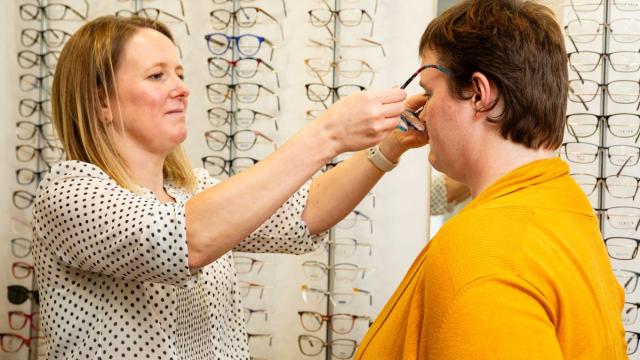Wearing glasses children (easy read)
Easy read fact sheet on wearing glasses for children.

All children should have an eye test at least every year.

The person who tests your child’s eyes is called an optometrist.
We will call them an optician in this factsheet.

After an eye test the optician may say your child needs new glasses.

Your child might need glasses to see things close to them:
Reading and writing.

Eating.

Using a computer, phone or tablet.

Your child might need glasses to see things further away:
Watching TV.

Watching someone signing.

Going to the cinema or theatre.

Moving around safely.

Wearing the right glasses will help children see clearly.

Some people need to wear glasses all the time or just sometimes.

Your child’s optician will tell you why your child needs glasses.
They will give you a prescription which tells you about your child’s eyesight.

You can go to any optician to choose your child's glasses.
You need to take your child's prescription and voucher with you to the optician.

We have a form called – ‘The results of your child’s eye test’.
You can ask the optician to fill this form in.

Your child may need 2 pairs of glasses.
Glasses for seeing things close to them, and glasses for seeing things further away.

To help you and your child remember which glasses are for which activities:
Your child could have different colour glasses.

Your child could have different colour glasses cases.

Your child could use stickers on the case to show what activities they are for.

There are different types of glasses to choose from.
Bifocals or varifocals are glasses that have special lenses.
The lenses will help your child see further away and close to them.

Your child can get glasses that help them see clearly that are also sunglasses.

Some glasses have lenses that go dark when the sun is out.

There are lots of frames that are very strong or very thin or flexible.
These frames might fit your child’s face better.
You should talk to a dispensing optician who will help you choose the right glasses.

Tell people who help and support your child about their eyesight.

They need to know what your child’s glasses are for.
You could write why your child wears glasses in their health action plan or personal records at home or school.

You may need to pay some money for your child's glasses.
Talk to the optician about the cost of your child's glasses.

You will be able to get a voucher that makes your child's glasses cheaper or free.

The optician will make sure your child’s glasses fit well.
They will measure your child’s face to check the glasses fit well and are comfortable.
It may take a week or more for them to make the new glasses.

It can take time for your child to get used to their glasses.
Your child may need to practice wearing them for a short time each day before they are happy to wear them all the time.
They may need support from people to help them get used to their glasses.

Your child can have a strap for their glasses.
This stops their glasses falling off, getting lost or broken.

You can ask the optician if you can have your child’s name put on the glasses frame.

Your child should clean their glasses gently with the cloth in the glasses case every day or when you see they are dirty.

If your child’s glasses get very dirty, wash them carefully in warm soapy water then dry them with a glasses cloth.

Use the glasses case.
When your child takes their glasses off, keep them safe in the glasses case so they don’t get scratched or broken.

Tell your optician if your child’s glasses don't fit, are broken or uncomfortable.

Your child’s glasses can become loose, slip down their nose, or even fall off their face.

You can take the glasses back to the optician if they are uncomfortable or you need to get them fixed.
An optician will often do small repairs for free.

If you find that your child can’t see as well, things are blurred or they are screwing their eyes up to see with their glasses on, their eyesight may have changed.

It is important to book another eye test.
It might be time to get new glasses.


